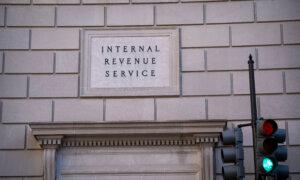The Treasury Department and the Internal Revenue Service (IRS) announced Thursday that a tax-collection initiative has succeeded in netting more than $1 billion in back taxes from wealthy taxpayers.
“The IRS in 2023 launched a new initiative to pursue high-income, high-wealth individuals who have failed to pay recognized tax debt,” the Treasury said in a July 11 press release. Last year, the IRS revealed it had collected $38 million from more than 175 of these targets. The agency then expanded the effort to 1,600 individuals leading to the billion-dollar collection.
The campaign focused on taxpayers who have more than $1 million in income and more than $250,000 in tax debts.
The Treasury said that prior to receiving IRA funds, the IRS was not in a position to ensure that wealthy taxpayers, large corporations, and complex partnerships paid their actual taxes.
IRS Commissioner Danny Werfel pointed out that “years of funding declines meant the IRS couldn’t get to money that we knew was owed, but we simply didn’t have the resources or staffing to collect.”
U.S. Secretary of the Treasury Janet L. Yellen said that “President Biden’s Inflation Reduction Act is increasing tax fairness and ensuring that all wealthy taxpayers pay the taxes they owe, just like working families do.”
Meanwhile, Republicans in Congress have criticized how the agency makes use of IRA funding. Their main concern lies in how much of the funding the agency deploys for enforcement activities, such as hiring new employees for cracking down on individual taxpayers.
Funding Purposes and Audit Rates
During an April 19 Senate Finance Committee hearing last year, Sen. John Thune (R-S.D.) raised concerns about the IRS using IRA funds for enforcement.“Of the $80 billion provided to the IRS in the partisan IRA, more than half, or about $46 billion, is directed toward enforcement activities, while only 4 percent of the $80 billion … was earmarked for improving taxpayer services,” he noted.
In May, the IRS said it would use IRA funds to boost enforcement personnel such as accountants, engineers, economists, data scientists, attorneys, and tax experts with specialized skills, stressing that the increase in employee count allowed the agency to “double audit rates on the wealthiest taxpayers.” Furthermore, the IRS seeks more funding over the coming years to grow its employee count.
A shortage of funds, on the other hand, will lead to an increase in scrutiny of low-income filers, the IRS warned.
Crackdown on Wealthy Taxpayers
In its latest press release, the Treasury noted that the IRS has launched several initiatives over the past two years targeting wealthy taxpayers.Specifically, the tax agency is cracking down on the abuse of corporate jets for personal use, pushing for collecting taxes owed by 125,000 high-income earners who have not filed taxes for many years, and is closing a tax loophole used by complex partnerships that could give the IRS more than $50 billion in additional revenues over the coming decade.
“In addition to enhancing tax fairness, these initiatives will narrow the gap between taxes owed and taxes paid, reducing the deficit,” the Treasury said.
Meanwhile, a Republican-led House appropriations subcommittee approved the fiscal year 2025 Financial Services and General Government Appropriations Act in June that cut down IRS funding.
The act sets aside $10.12 billion for the IRS in fiscal 2025, which is $2.2 billion less than what was allocated in fiscal 2024. It reduced the tax agency’s enforcement funding by $2 billion.
Rep. Dave Joyce (R-Ohio), chairman of the subcommittee, said that the bill “takes steps to prevent agencies like the IRS from unfairly targeting hardworking Americans.”
The funding cuts were criticized by Rep. Steny H. Hoyer (D-Md.): “This bill lets tax cheats off the hook by cutting IRS funding—all at the expense of hardworking Americans who dutifully pay their taxes,” he said. “These cuts cost far more than they save.”





